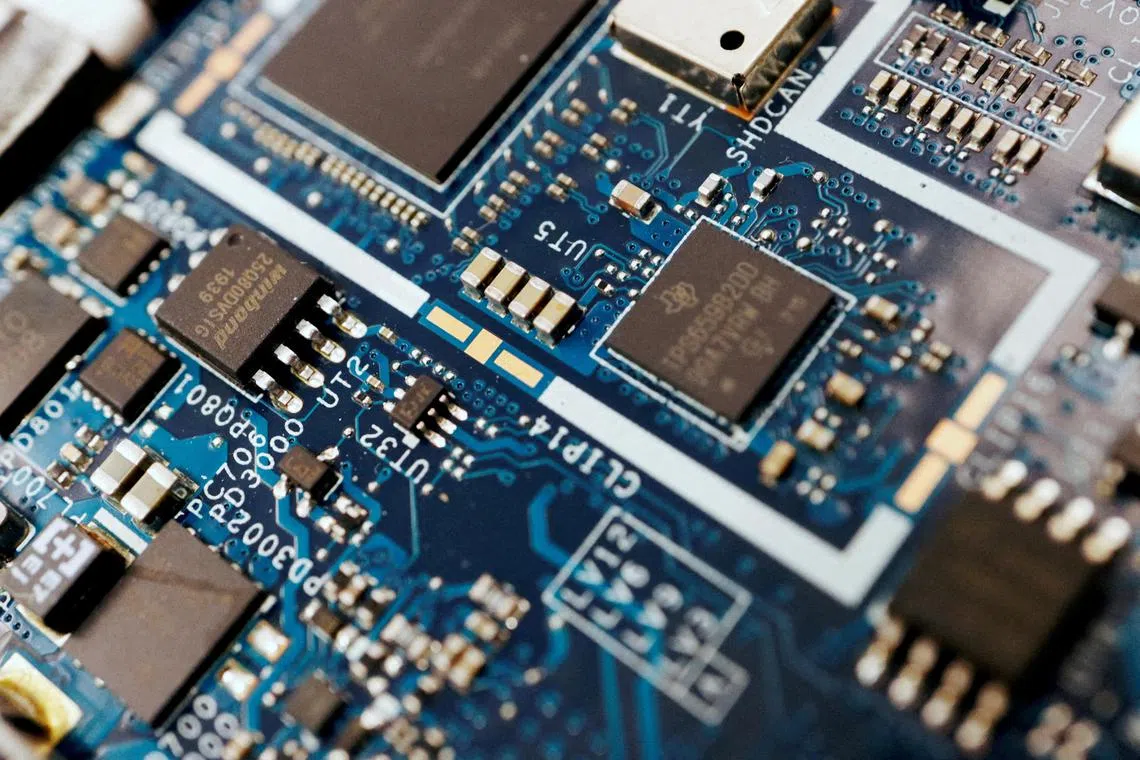Editorial Notes
South Korea’s embattled chip industry: Korea Herald
The paper says the government needs to seek ways to minimise the negative impacts of the US government’s export control policy.
Sign up now: Get insights on Asia's fast-moving developments

Semiconductor chips are seen on a circuit board of a computer, on Feb 25, 2022.
PHOTO: REUTERS
SEOUL - South Korean chipmakers are likely to face not only a slowdown in demand for semiconductors, but also critical restrictions from the US over production in China - collateral damage from the intensifying friction in US-China trade.
The US is reportedly planning to limit the level of advanced chips that Korean chip manufacturers can produce in China in the name of blocking the transfer of its advanced semiconductor technology to adversaries.
“We are now in a world where technology is the driver of military power, (with) advanced technologies, cutting-edge critical technologies, (and) semiconductors being at the centre of those technologies,” said Alan Estevez, undersecretary of commerce for industry and security, at a forum last week.
His comments reflect the US’ suspicion that China may be stealing its cutting-edge technology to strengthen its own chip-building capability, which could pose a threat.
This situation does not involve only the confrontation between the US and China. Of course, China is accused of having engaged in industrial espionage through Chinese tech firms. But the US, for its part, has been stepping up protectionist trade restrictions in recent years, citing security concerns.
As this stance is intended to appeal to its own citizens and companies, it seems unlikely that the US will reverse its course.
In October, Korean semiconductor producers were given a one-year licence to continue producing their products in China. The grace period was as part of US export restrictions on chips and other technologies to China.
What Estevez suggested is that the US will not extend the grace period beyond October this year and possibly impose more controls on chip production in China.
Unfortunately, such US policy on advanced technology, if implemented in October, is feared to seriously damage the South Korean chip industry as a whole. As with other Korean exporters, Samsung Electronics and SK hynix have been closely interlocked with both the US and China in terms of chip production and exports.
Korea exports some 40 per cent of its chips to China, an undisputedly crucial market for local chip producers. Samsung’s Chinese chip plant in Xian produces around 40 percent of the company’s NAND flash memory products, while SK hynix’s factory in Wuxi manufacturers about 48 per cent of its DRAM chips.
The two chip companies combined are estimated to have so far invested in over 50 trillion won (S$51.2 billion) in Chinese chip production facilities. Much of their heavy investment might go to waste if they are blocked by the US, preventing further use of advanced chip production technology.
Furthermore, troubles with Chinese factories could spark a severe backlash to Samsung and SK hynix. Under the CHIPS and Science Act, the US government is scheduled to receive subsidy applications from companies planning to construct chip plants within the US.
If Samsung and SK hynix want to receive subsidies for the plans to build chip facilities in the US, they have to sign a pact that will restrict chip production in China for the next 10 years. Depending on how the US tweaks the rules, the Korean chip producers may be stuck with outdated technologies for their Chinese plants.
It is regrettable that the US is set to go ahead with such restrictive measures that could undercut the companies of its allies. It also goes against what the US preaches about free markets in the past, as the current policy is largely designed to put its companies in a better position than foreign counterparts and expand its own chip industry with exclusive technologies.
But the Korean government cannot afford to complain about US export controls on semiconductor technology.
In 2022, Korean carmakers suffered a critical setback due to the similarly protectionist Inflation Reduction Act, which calls for up to US$7,500 (S$10,090) in tax credits to buyers of electric vehicles assembled in North America. Concerns mounted that Hyundai Motor and Kia Corp., both of which assemble EVs at domestic plants, could lose market share in the US.
The government should make sure that Korean chip manufacturers will not face similar disadvantages by holding active negotiations with the US government and seeking ways to minimise the negative impacts of the export control policy. THE KOREA HERALD/ASIA NEWS NETWORK
The paper is a member of The Straits Times’ media partner Asia News Network, an alliance of 22 news media titles.


